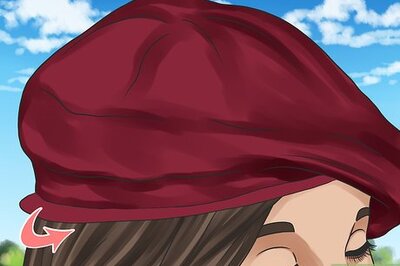
views
X
Research source
Diagnosing Mono

Spot the symptoms of mono. Mono is not always easy to diagnose at home. The best way is to look for the following symptoms, especially if they do not go away after a week. Don’t wait too long to see a doctor since symptoms can worsen over time. Severe fatigue. You may feel excessively sleepy, or just lethargic and unable to muster any energy. You may find yourself exhausted after the smallest bit of exertion. This can also manifest as a feeling of malaise or general unwellness. Sore throat, especially one that doesn't go away after taking antibiotics. Fever. Swollen lymph nodes, tonsils, or a diagnosis of swollen liver or spleen. Headache and body aches. Occasionally a skin rash. Loss of appetite.

Don't mistake mono for strep throat. Because of a sore throat, it is easy to at first think your mono is actually strep. But unlike strep, which is caused by the Streptococcus bacteria, mono is caused by a virus and cannot be treated with antibiotics. Talk to your doctor if your sore throat doesn't get better after taking antibiotics.

See your doctor. If you suspect you have mono, or if you have figured out that you have mono but symptoms continue for more than a week with rest, you should go see your doctor. Your doctor is likely to diagnose you based on your symptoms and feeling your lymph nodes, but they can also perform a blood test to find out more or less for sure. Monospot antibody tests check your blood for Epstein-Barr virus antibodies. You will get results within a day, but this test may not be able to detect mono during your first week of symptoms. There is a different version of the antibody test that can detect mono within the first week, but it requires a longer result time. Tests looking for elevated white blood cell counts can also sometimes be used to suggest the presence of mono, but won't actually confirm mononucleosis for sure.
Managing Symptoms at Home

Get plenty of rest. Simply sleep and relax as much as possible. Bed rest is the main treatment for mono, and as you will be fatigued it feels like the natural thing to do. Resting is especially important in the first two weeks. Due to the fatigue it causes, people with mono should stay home from school and put other regular activities on hold. This doesn't mean you can't be occasionally social, however. Spending time with friends and family can be a good way to keep spirits up during what is otherwise a lousy and frustrating time—just avoid exertion and be prepared to rest when they go home. Avoid physical contact with them, especially any involving saliva, and wash your hands thoroughly.

Drink lots of fluids. Water and fruit juices are best—aim for several 8 glasses of water at the very least per day.

Relieve your sore throat with a salt water gargle. Mix ½ teaspoon (2.5 g) of table salt with 8 fluid ounces (240 ml) of warm water. You can do this several times a day.

Take an over-the-counter pain reliever to reduce throat pain and body aches. If you can take the pain medication with food. Acetaminophen (such as Tylenol), naproxen (Aleve), or ibuprofen (such as Advil or Motrin IB) are all fine. Taking aspirin when feverish can put children and teens at risk for Reyes' Syndrome. It is almost nonexistent in adults.

Avoid strenuous activity. Within the first 3 weeks of having mono, your spleen may become enlarged and strenuous exercise, especially heavy lifting or contact sports, puts you at risk of rupturing your spleen. A burst spleen can be extremely dangerous, so go to the hospital immediately if you have mono and experience a sharp, sudden pain in the left side of your upper abdomen or shoulder. Abdominal pain can radiate to the shoulder and cause pain even though the spleen is not in that area.

Try not to pass the virus to others. Since symptoms don't manifest until the virus has been in your system for weeks, you may have already infected some people, but do your best to spare your friends and family the misery you are going through. Don't share food, drink, silverware, or cosmetics with anyone. Try not to cough or sneeze on other people. Don't kiss anyone and avoid sexual contact.
Seeking Medical Care

See a doctor if you develop secondary infections. Your body will be weak and more susceptible to invasion from bacteria. Mono sometimes comes with strep or infections of the sinus or tonsils. Watch out for these and go to your doctor for antibiotics if you suspect you are getting a secondary infection.

Seek emergency surgery if your spleen ruptures. If you experience a sharp, sudden pain in your upper abdomen or shoulder, especially during lifting or physical activity, you should get to a hospital immediately or call emergency services.

Realize that antibiotics don’t work for mono. Antibiotics help your body destroy bacterial infections, but mono is caused by a virus. It is also not usually treated with antivirals.




















Comments
0 comment